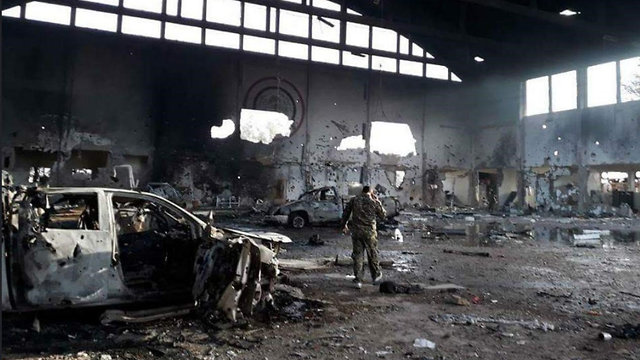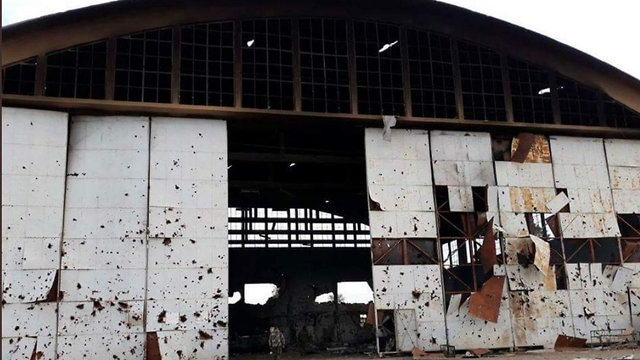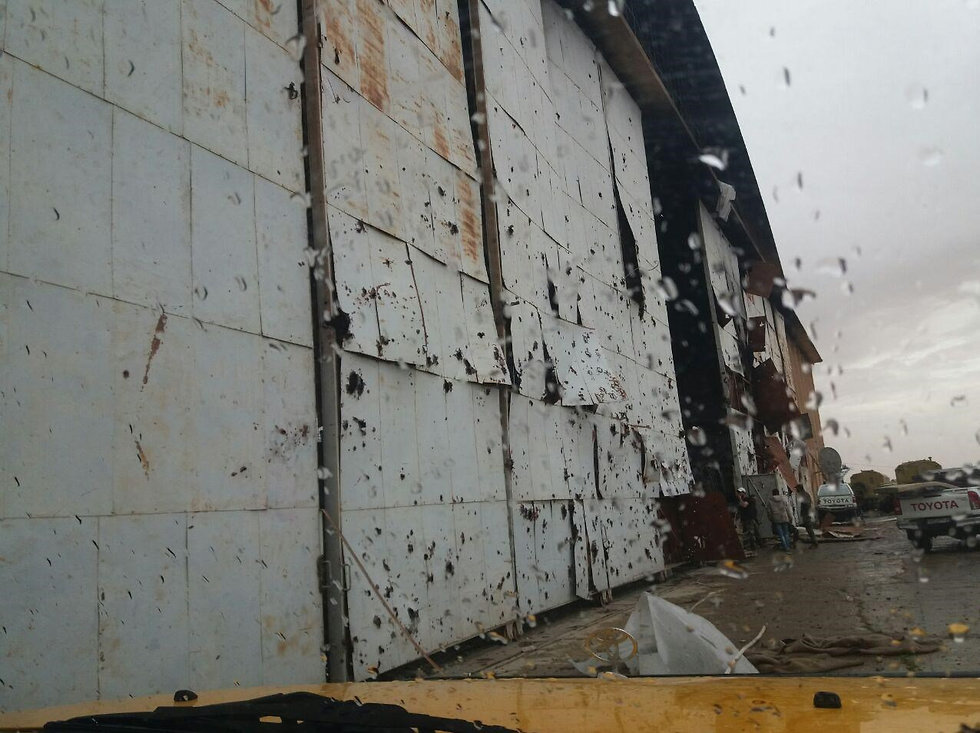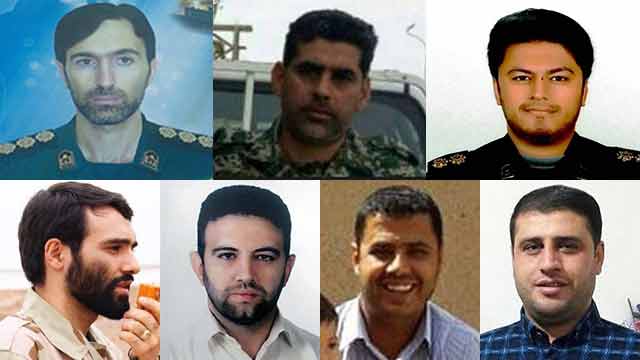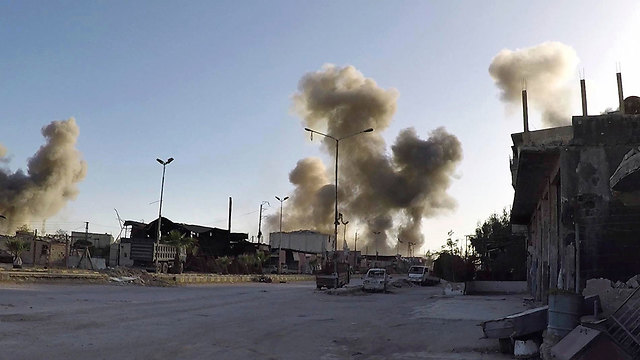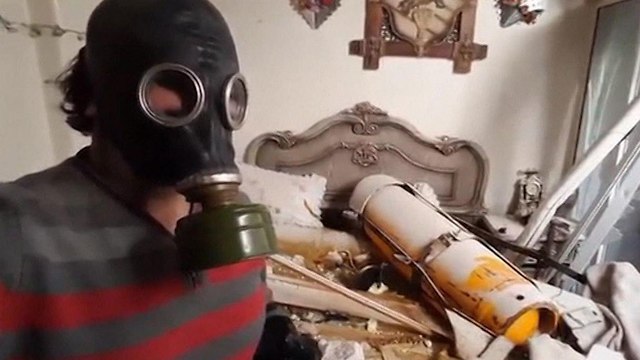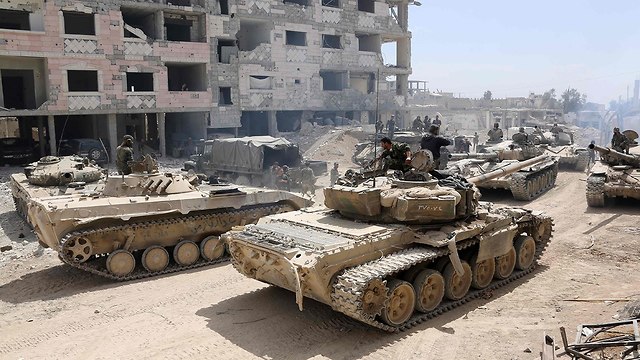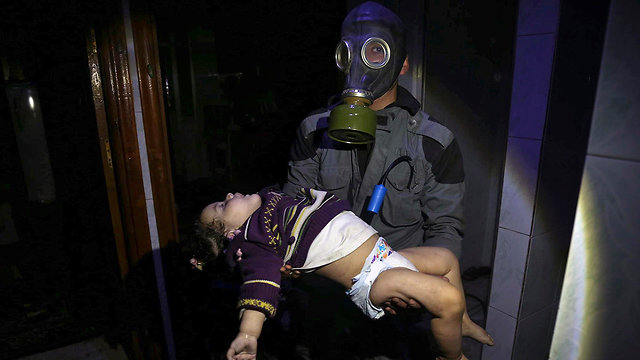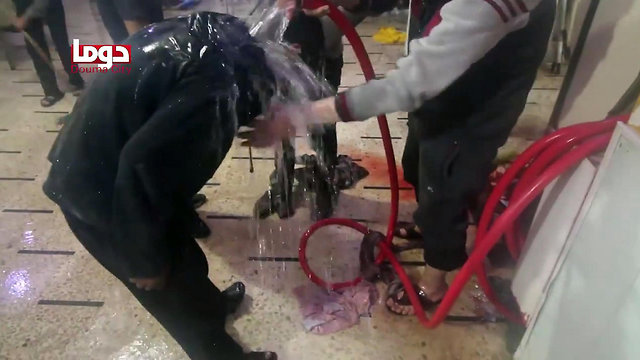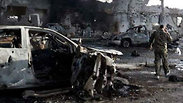

Photos emerge from bombed Syrian base
Iranian news agency publishes photos from T-4 base, which was attacked in a strike attributed to Israel; in unusual move, media in Tehran also release photos of seven Iranian 'military advisers' killed in the strike; tensions mount in northern Israel as IDF prepares for possible reprisal.
The strike, which apparently destroyed an Iranian drone base, claimed the lives of 14 military personnel, among them at least seven Iranian "military advisers."
Israel has neither confirmed nor denied its involvement.
The T-4 base is hundreds of kilometers away from the Israeli border, located between the cities of Homs and Palmyra. Other than the Syrian army's air and ground forces, it also houses Iranian Revolutionary Guards forces. A small Russian aerial force is also stationed at the base.
The T-4 base's location plays a crucial role in the fighting in the Middle East, as it is situated in the middle of the Syrian section of the ground and aerial corridor from Teheran, through Lebanon and Syria's Mediterranean ports.
Just two months ago, a stealth drone the Revolutionary Guards tried to infiltrate Israel with left from the T-4 airbase. In addition, it is common knowledge the Revolutionary Guards supervise the Iraq-Syria border crossings they control from the T-4 base.
In an unusual move, Iranian media released photos of the seven "military advisers" who were killed in the attack in the Homs District, some of them officers in the Revolutionary Guards. The Fars news agency reported the bodies of the seven had arrived back in Tehran.
In Israel, the Air Force and the Northern Command have raised the level of alertness in recent days to prepare for the possibility of an Iranian retaliation for the strike from Syrian territory.
'Major crisis' looms over possible retaliation for chemical weapons attack
Tensions were also high on Israel's northern border ahead of possible retaliation by the US and its Western allies to a suspected chemical weapons attack in Syria over the weekend, which claimed the lives of over 60 people in Douma and has been largely attributed to the regime of Syrian President Bashar Assad.
Russia, Assad's ally, has rejected claims his regime was behind the attack and has vowed to respond to any retaliatory attack against the Syrian army.
Russia's Ambassador to Lebanon Alexander Zasypkin told Hezbollah's TV network Al Manar that "If there is a strike by the Americans then ... the missiles will be downed and even the sources from which the missiles were fired."
He warned of a possible "major crisis" and said Moscow was willing to hold talks on the matter.
Zasypkin said the US and its Western allies considered the Syrian army's recent victories in eastern Ghouta as their failure, and that they were trying to undermine the understandings reached in the Turkey-Russia-Iran summit held in Ankara recently.
A joint UN-OPCW investigative team accused Syria of using chlorine gas in at least two attacks in 2014 and 2015 and the nerve agent sarin in an aerial attack on Khan Sheikhoun in April 2017 that killed about 100 people and affected about 200 others. The latter attack led to a US airstrike on a Syrian airfield.
The Pentagon updated Israel ahead of the April 2017 American attack in Syria, which allowed the defense establishment to prepare for a possible Syrian aerial or ground response.
However this time, there are two factors working to Israel's detriment: The reports from Washington and Moscow pointing to Israel as being responsible for the T-4 base attack serve to further erode the "plausible deniability" that has so far allowed Israel to attack without fearing reprisal. In addition, Assad is much stronger today, more confident and on his way to winning the civil war in his country with the aid of the Russians.
Meanwhile, French President Emmanuel Macron said Tuesday that if his nation was to launch a retaliatory strike on Syria, it would target chemical weapons facilities.
"Our decision will not target allies of the regime or attack anyone but rather attack the regime’s chemical capabilities," he said, adding he did "not want an escalation."
He said talks with the US and Britain on the matter were ongoing, adding a decision would be made "in the coming days."
Macron also said French intelligence had shown "that chemical weapons were indeed used and that the regime could clearly be held responsible."
The French president further accused Russia of violating UN Security Council decisions on the ceasefire in Syria.
Also on Tuesday, British Prime Minister Theresa May and US President Donald Trump spoke on the phone, agreeing that the reported chemical attack in Douma was “utterly reprehensible” and that the international community must respond to uphold the worldwide prohibition on chemical weapon use.
“They agreed they would continue working closely together and with international partners to ensure that those responsible were held to account,” a statement from May’s office said.
May had earlier agreed the same thing in a call with French President Emmanuel Macron.
A White House statement said Trump and May “agreed not to allow the use of chemical weapons to continue.”
Ron Ben-Yishai, Reuters and AFP contributed to this report.














